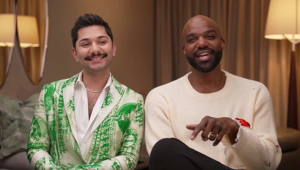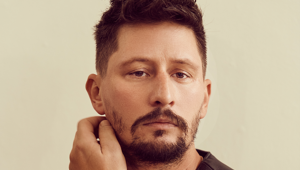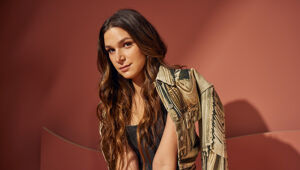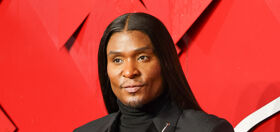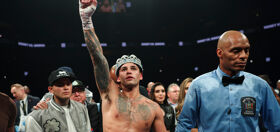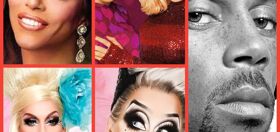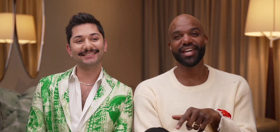
Thom Fitzgerald has a quiet shyness about him. The Canadian director has made a reputation for himself directing queer-themed material, including the films Cloudburst, Splinters and The Event, as well as episodes of the TV series Sex & Violence and Forgive Me. His latest film, Stage Mother, takes Fitzgerald into uncharted territory: comedy.
Stage Mother follows the story of Maybelline (Jacki Weaver), a Texas housewife and church choir director estranged from her gay son. When Maybelline learns of her son Ricky’s untimely death due to a drug overdose, she travels to San Francisco to pay tribute to his life. When she arrives, she gets more than she bargained for, including inheriting her son’s drag club, confronting his mess of a best friend (Lucy Liu) and helping his boyfriend (Adrian Grenier) cope with the loss. Ever the director, Maybelline resolves to overhaul the drag club and make the queens there into consummate cabaret performers. Jackie Beat, Mya Taylor, Allister MacDonald and Oscar Moreno also star.
Stage Mother made its debut at the virtual Frameline44 festival, and will play the virtual Provincetown Film Festival July 16-19. We caught up with Fitzgerald to discuss the film, his career, and how he landed two-time Oscar nominee Weaver for the lead.
How did Brad Hennig’s script come to you?
How about we take this to the next level?
Our newsletter is like a refreshing cocktail (or mocktail) of LGBTQ+ entertainment and pop culture, served up with a side of eye-candy.
Well I received it via my producer, Ann Clements. The story I heard is that Brad and his producing partner Lori Lacob saw my film Cloudburst together, maybe even at Frameline. They decided that we’d be a good match.
So did you want to do it right away?
I was very moved by the script, both in terms of its emotional parts as well as Brad’s sense of humor. At the time I had recently lost my brother, and seen my mom getting to know a lot about him posthumously. So that aspect of the story—a mother learning to know her son better after his death—was something that spoke directly to my experience. I thought I could lend something unique to the story as director.

This is a departure for you, in that you’re more closely associated with drama. It’s ironic that Brad saw Cloudburst and thought you would be great for a screwball movie. Why a broad comedy?
Well, I think the kind of comedy I love is based in drama. This is a comedy, but it’s also a story of a mother grieving and becoming a better mother. I knew that if I could dig into it in an honest way, it would be funny. Jacki, bless her, never plays the punchline. She insisted on being authentic in her emotional journey in the film.
She’s one of the great character actresses working today. How did you arrive at Jacki Weaver?
Well, Jacki lives in California. I live in Nova Scotia. We decided to have a date in New York City. So we got together for a weekend of heavy drinking, laughter and tears.
[Laughter]
And we came out the other side as collaborators. We fell in love pretty fast.
Was she the first actress you had in mind?
Well, we came to the project close to the same time. The project had a history before I got involved, but she was the first actress I met for the part.

You also got Lucy Liu to play a supporting comic role. She’s not someone known for comedy, either. How did you seduce her?
Lucy and I did a film together in 2005 called 3 Needles. She played a Chinese blood smuggler—it’s one of those darker movies you referred to. But we also forged a great friendship. So I know her to be one of the funniest people that I’ve ever encountered. She’s so sharp and witty and can be so bubbly. That’s not, as you point out, the kind of role she’s known for: doctors, detectives, lawyers. I knew she’d make a great ditzy blond.
Related: Paris club fires back at ‘Drag Race’ winner Violet Chachki, threatens legal action
She’s very fun.
And she was very gracious. She did this while she was shooting Elementary. She’d do that all week and come up to Canada on weekends.
Wow. That’s amazing. It also speaks well of you.
And of her.
Certainly. The character I think I most liked in the film, apart from Maybelline, is Cherry. Thank you for giving Mya Taylor another good part. How did you arrive at her?
Well, Brad had written one of the main drag queens as a transgender queen. So that aspect of the character was in the script. She’d had such success in Tangerine, so it seemed like something to explore. Mya didn’t have any previous exposure to drag.

Really?
Nothing in her background was drag. She’s an actress. So that was a challenge for her: to explore this different world of drag. Of all the drag queens, she knew the least about drag going in. She’s absolutely lovely and fun to be around. I think it was also fun to see her pick up all those things about drag as we went along. And she did a great job.
It’s never expressly said in the film what transpired between Maybelline and Ricky. Did you and Brad and Jacki discuss that backstory?
For me, I think I appreciated that the audience could fill that in for themselves. As you know, it’s not uncommon for LGBTQ people to be estranged from their families. Sometimes it’s about one incident, sometimes it’s more. So the estrangement didn’t have to be so specific in allowing the present day story to be specific. Jacki would probably say it has a lot to do with Jeb. Her loyalty to her husband got in the way of her being a good mother.
Maternity is a central theme to the piece: Maybelline essentially becomes a mother to all her son’s friends because she abdicated her duties to him. And Maybelline’s emancipation is central to her arc. Forgive me if this is personal, but what’s your relationship like with your own mother? Did you discuss Brad’s mom with him? How did that influence you?
Well I know that Brad is a gay Texan who now lives in San Francisco.
That sounds familiar.
I’m quite certain that his mother inspired some aspects of the story, though I couldn’t name what. For me, as I mentioned, watching my mother’s experience of growing to love her late son was very much a doorway for me into the story. Sadly, my mom passed away in March. She’ll never get to see Stage Mother.
I’m so sorry.
I’m sure part of my motivation to take it on was to make a movie that would please my mom. She’ll have to watch it from another plain.

One thing I noticed about the film, stylistically speaking, is that it’s almost a clandestine musical. There are lots of songs, and lots of performances. Was that intentional?
Yes. The script was not a musical. Brad referenced stage numbers and even mentioned some songs, but the script didn’t go into it. I think for me, as a filmmaker, I absolutely thought of it as a backstage musical. A lot of people had input to the selection of songs, but I made sure those songs reflect and inform the dramatic narrative around them. It’s not exactly a classic musical. But it is a jukebox musical in that way. And the story is all happening backstage.
And you end with a big musical number.
Well I shot every musical number in full, actually. So everybody got to get up there and do their whole number. Then the editing process it revealed how much of the song needed to be there.
Obviously, the budget here was tight. You shot B-Roll in San Francisco, but the bulk in Nova Scotia. What was the biggest challenge for you working under those conditions?
Well, I’ve been an indie filmmaker for a long time now, so I’ve been in worse predicaments. Being in a remote studio location was one of the hardest things, and one of the best things about this movie. We built the gay bar. On one hand, we had to have Lucy flying in every Friday from New York, which made it a challenge.
Sure.
On the other hand, all of these actors and queens, being camped out together in this imaginary gay bar far from their own lives, forced them to really bond together and blend together as a chosen family. They’re working 12, 13 hours a day, and none of them could go home at the end of the day. They really got to feel like the family on screen. They got to fighting. They got to hooking up. The chemistry that the low budget required comes across on screen.

Queer themes are central to so much of your work. As a gay man, do you feel like you have an obligation to tell those stories, or is that natural to your own creativity?
I think it’s natural. When I sit down to write, I don’t use sexual identity as a starting point, at least not in the forefront of my mind. I feel like it’s a point of view I bring to the art form. I don’t feel limited by it. Although my films are sometimes taken to be overtly political, that’s never my starting place. Stage Mother is a movie about a woman coming into her own. That’s the essence of the story, though it’s not a particularly gay story. Everything beyond that has to do with sensibility and truthfulness.
Stage Mother continues to play the festival circuit. Next up: the virtual Provincetown Film Festival July 16-19.


